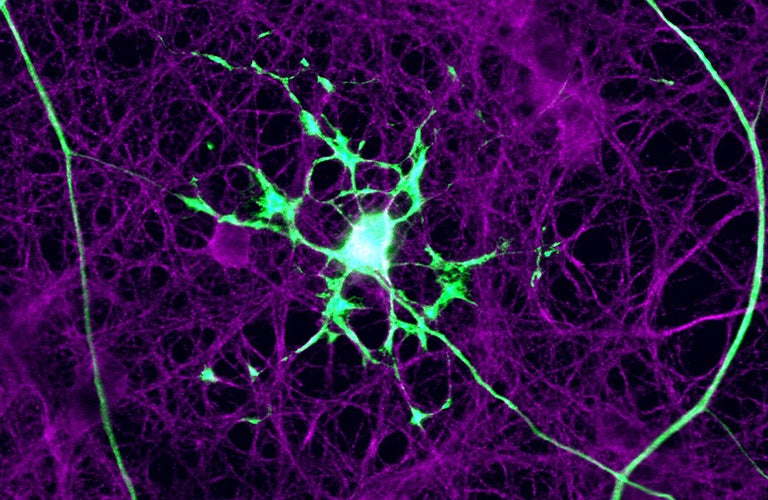Huang Receives Award to Research MS Treatment
April 9, 2019 — Professor Jeffrey Huang of the Georgetown College Department of Biology has received a major award from the National MS Society to continue research on a potentially groundbreaking treatment for multiple sclerosis.
The Harry Weaver Neuroscience Scholar Award comes with a grant that will fund Huang’s research for the next five years on a drug target to promote myelin regeneration.
UNIQUE PATHOLOGY
Multiple sclerosis is a degenerative neurological disease affecting more than 2 million people worldwide. Patients suffer episodes of attack when myelin, the insulating cell layer on nerve cells that helps them to function properly, degenerates. In early years of the disease, myelin grows back soon after injury.
As the disease progresses, however, the loss of myelin becomes more permanent. Neurological symptoms — motor and sensory problems, muscle weakness, difficulty speaking and more — degenerate further as the myelin layer struggles to regenerate, leading to chronic neurodegeneration.
“It’s a devastating disease.” Huang said. “Patients have an attack and get better, and this can go on for 20 or 30 years. But many patients inevitably enter the progressive stage where they can no longer recover and develop irreversible disability. The disease pattern is complex yet fascinating — why does that happen?”
TARGETING INFLAMMATION
Huang, who has long been fascinated by the structure of myelin, runs a laboratory that now studies methods of promoting its regeneration. He has recently focused on oligodendrocyte precursors, cells in the nervous system that are mobilized following injury to help rebuild myelin.
His team noticed that amino acid levels are elevated in brain lesions — spots of myelin degeneration — in mouse model of MS. They have discovered that proteins involved in amino acid metabolism could help modulate the inflammation that makes regeneration difficult.
“One of the major problems in multiple sclerosis is inflammation,” Huang said. “If we’re able to alter the level of amino acids in lesions, we may be able to modulate inflammation in the damaged nervous system and allow the repair process to occur.”
WORKING TOWARD A TREATMENT
The Weaver Award will allow Huang to continue studying the role of amino acid metabolism on mouse models of MS over a five-year period. He plans to understand how amino acid metabolism regulates myelin regeneration, and examine potentially novel drugs targeting amino acid metabolism in mice.
“We’ve been able to reduce inflammation and promote remyelination in mice,” Huang said. “Essentially, they’re able to recover from their disability.”
If the drugs proved viable, they could potentially move into clinical trials and eventually serve as a groundbreaking treatment for MS patients — particularly late-stage patients, for whom disability resulting from the disease was thought to be permanent.
“It’s still in its early stages, but there’s a lot of promise in this work,” Huang said. “This fellowship gives me the freedom to focus on my research, and I’m very excited about it.”
